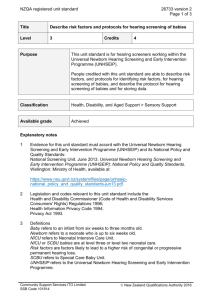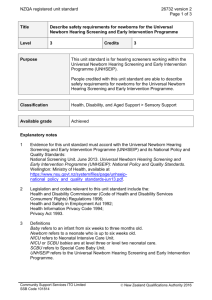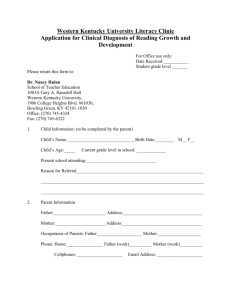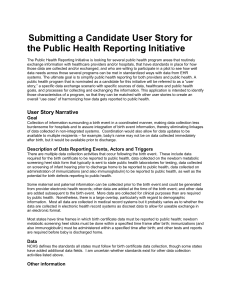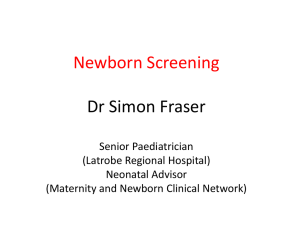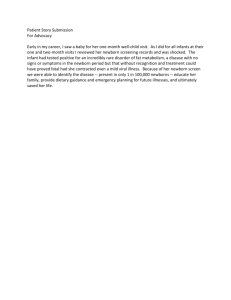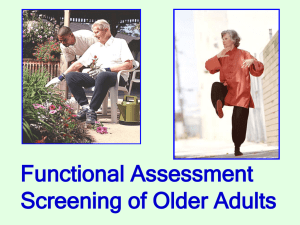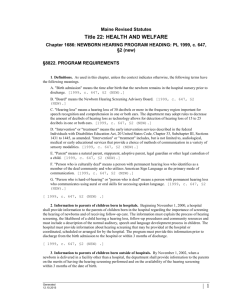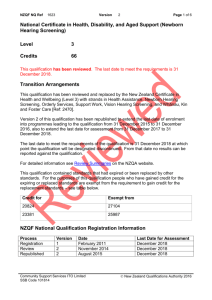26736 Describe communication and providing information
advertisement
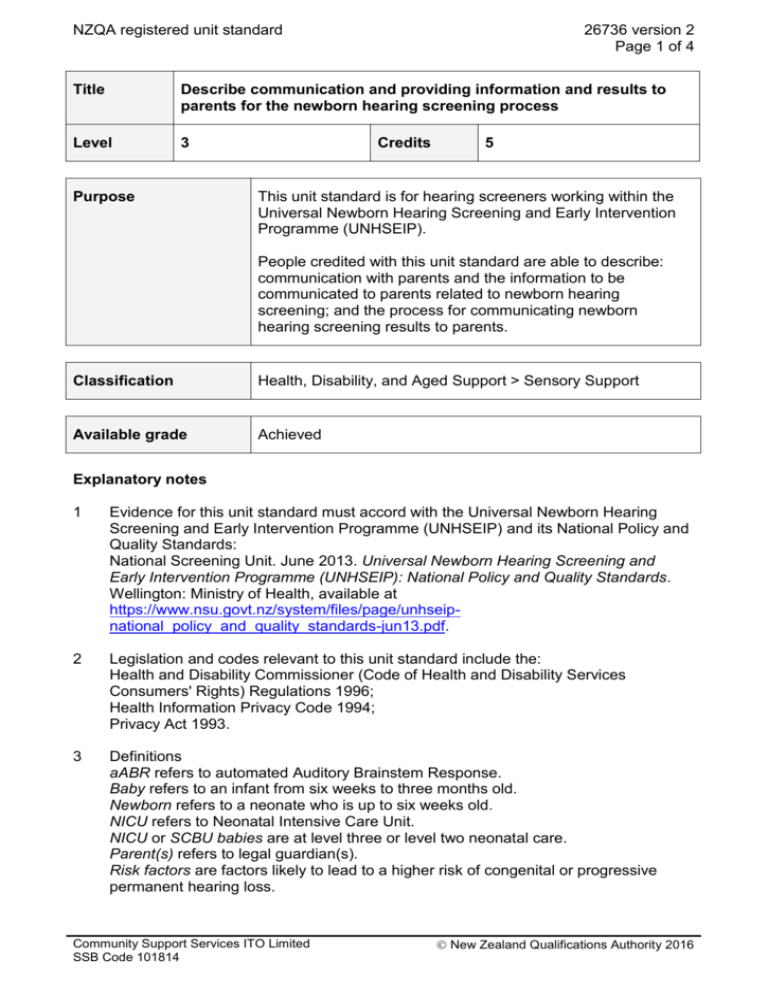
NZQA registered unit standard 26736 version 2 Page 1 of 4 Title Describe communication and providing information and results to parents for the newborn hearing screening process Level 3 Purpose Credits 5 This unit standard is for hearing screeners working within the Universal Newborn Hearing Screening and Early Intervention Programme (UNHSEIP). People credited with this unit standard are able to describe: communication with parents and the information to be communicated to parents related to newborn hearing screening; and the process for communicating newborn hearing screening results to parents. Classification Health, Disability, and Aged Support > Sensory Support Available grade Achieved Explanatory notes 1 Evidence for this unit standard must accord with the Universal Newborn Hearing Screening and Early Intervention Programme (UNHSEIP) and its National Policy and Quality Standards: National Screening Unit. June 2013. Universal Newborn Hearing Screening and Early Intervention Programme (UNHSEIP): National Policy and Quality Standards. Wellington: Ministry of Health, available at https://www.nsu.govt.nz/system/files/page/unhseipnational_policy_and_quality_standards-jun13.pdf. 2 Legislation and codes relevant to this unit standard include the: Health and Disability Commissioner (Code of Health and Disability Services Consumers' Rights) Regulations 1996; Health Information Privacy Code 1994; Privacy Act 1993. 3 Definitions aABR refers to automated Auditory Brainstem Response. Baby refers to an infant from six weeks to three months old. Newborn refers to a neonate who is up to six weeks old. NICU refers to Neonatal Intensive Care Unit. NICU or SCBU babies are at level three or level two neonatal care. Parent(s) refers to legal guardian(s). Risk factors are factors likely to lead to a higher risk of congenital or progressive permanent hearing loss. Community Support Services ITO Limited SSB Code 101814 New Zealand Qualifications Authority 2016 NZQA registered unit standard 26736 version 2 Page 2 of 4 SCBU refers to Special Care Baby Unit. UNHSEIP refers to the Universal Newborn Hearing Screening and Early Intervention Programme. Outcomes and evidence requirements Outcome 1 Describe communication with parents related to newborn hearing screening. Evidence requirements 1.1 Plain English language is used when explaining screening terminology to parents in accordance with the National Policy and Quality Standards. Range 1.2 Communication strategies to be used by hearing screeners when interacting with parents are described in terms of the information being conveyed and the situation in accordance with the National Policy and Quality Standards. Range 1.3 screening terminology includes but is not limited to – hand set, ear cushion, electrode, pass, refer. strategies include but are not limited to – providing and explaining pamphlets and/or other informational documents, use of empathy, cultural sensitivity, use of interpreters. Communication with parents of newborns in NICU and in SCBU is described in terms of newborns’ specific needs and the screening method. Outcome 2 Describe the information to be communicated to parents related to newborn hearing screening. Evidence requirements 2.1 Information to be communicated to parents about the hearing screening process is described in terms of the advantages, disadvantages, and/or potential harm of the hearing screening process. 2.2 Newborn hearing screening pamphlets are identified and their purpose is described for specific situations. Range specific situations include – results, referral, rescreen. 2.3 Information to be communicated to parents when hearing screening is declined is described in accordance with the National Policy and Quality Standards. 2.4 Information to be communicated to parents in relation to obtaining informed consent and maintaining confidentiality and privacy is described in accordance with the National Policy and Quality Standards. Community Support Services ITO Limited SSB Code 101814 New Zealand Qualifications Authority 2016 NZQA registered unit standard 26736 version 2 Page 3 of 4 Outcome 3 Describe the process for communicating newborn hearing screening results to parents. Evidence requirements 3.1 The benefits of effective communication of results to parents are described. Range 3.2 evidence is required of three benefits. The information to be communicated to parents for each newborn hearing screening outcome is described in accordance with the National Policy and Quality Standards. hearing screening outcomes must include are but not limited to – aABR1 (pass); aABR1 (refer rescreen required); aABR2 (refer to audiologist); incomplete. Range Planned review date 31 December 2016 Status information and last date for assessment for superseded versions Process Version Date Last Date for Assessment Registration 1 22 October 2010 31 December 2016 Rollover and Revision 2 17 September 2015 N/A Consent and Moderation Requirements (CMR) reference 0024 This CMR can be accessed at http://www.nzqa.govt.nz/framework/search/index.do. Please note Providers must be granted consent to assess against standards (accredited) by NZQA before they can report credits from assessment against unit standards or deliver courses of study leading to that assessment. Industry Training Organisations must be granted consent to assess against standards by NZQA before they can register credits from assessment against unit standards. Providers and Industry Training Organisations, which have been granted consent and which are assessing against unit standards must engage with the moderation system that applies to those standards. Requirements for consent to assess and an outline of the moderation system that applies to this standard are outlined in the CMR. The CMR also includes useful information about special requirements for organisations wishing to develop education and training programmes, such as minimum qualifications for tutors and assessors, and special resource requirements. Community Support Services ITO Limited SSB Code 101814 New Zealand Qualifications Authority 2016 NZQA registered unit standard 26736 version 2 Page 4 of 4 Comments on this unit standard Please contact the Community Support Services ITO Limited info@careerforce.org.nz if you wish to suggest changes to the content of this unit standard. Community Support Services ITO Limited SSB Code 101814 New Zealand Qualifications Authority 2016
